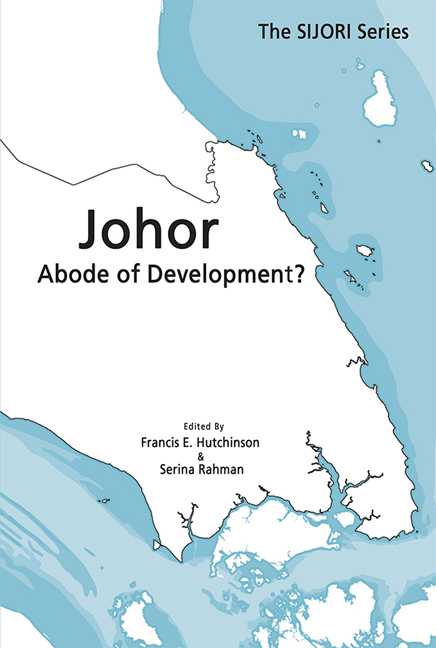16 - Housing Policy in Johor: Trends and Prospects
Published online by Cambridge University Press: 24 November 2020
Summary
INTRODUCTION
Housing development in Johor has undergone profound transformation over the last few decades. High-rise apartments are now a common sight in downtown Johor Bahru. Luxury enclaves, complete with gated security and leisure facilities, encroach on waterfront land along the Tebrau Strait. Foreign developers have built new townships on reclaimed land, exhorting international buyers to invest their future in the project as well as the rest of Johor. This chapter will examine housing policies and development strategies in Johor, especially those related to the establishment of Iskandar Malaysia (IM). The history of Johor's housing trends and its prospects in the near and medium term will also be analysed. This chapter argues that the launch of IM had a far-reaching impact not only on housing stock, but also on property ownership practices in Johor.
There are three main sections in the chapter. The first section focuses on housing provision and policy in Johor with an analysis of statistical data such as housing stock and distribution of income. The section will ascertain the manner in which the state government manages Johor's housing blueprint. It also discusses associated opportunities and challenges faced by the state government and housing developers, both private and government-linked corporations (GLCs).
The following section illustrates overall practices of housing development in Malaysia since independence. This section considers how housing is managed under national development plans, by-laws, and policies. We examine the major agendas and aspirations for housing in Malaysia and how housing provisions is carried out at both federal and state levels. We also look at the roles of the different layers of government and private developers in housing provision and how these roles evolved in tandem with global trends of economic liberalization. We then take a closer look at housing trends in southern Johor over the last decade, especially those related to the implementation of Iskandar Malaysia.
Acknowledging the rise of Iskandar Malaysia as a regional business hub and its profound impact on Johor, the third section adopts a grounded approach in presenting two case studies to make sense of the housing situation in the state. These projects are Medini Iskandar Malaysia (Medini) and Forest City, two of the largest housing projects within Iskandar Malaysia. It will also reflect on the rather different business models, architectural concepts, and development strategies of both projects.
- Type
- Chapter
- Information
- JohorAbode of Development?, pp. 424 - 446Publisher: ISEAS–Yusof Ishak InstitutePrint publication year: 2020



